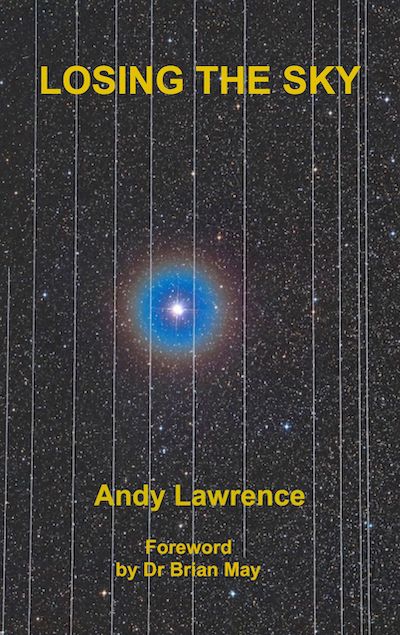
The book is a non-technical polemic about the pollution of the night sky by large satellite constellations. You can get the ebook from Apple Books or Amazon, or Google Play Books. Only £1.99! There is also a paperback version at Amazon which is £5.99. For people who are nervous about ebooks, the Google version is particularly nice because you don’t need an app – you can just read it in the browser. (Note that the Amazon link is to amazon.co.uk – you will probably need to search for it in your local version of Amazon, because you can’t buy from the UK website if you live in France, etc. For example, here is the German version.)
My fellow astronomers round the world have been forming professional working groups, and doing technical studies – you can read all about those and follow the links in the book. This is a bit different. Its aimed at the general reader, its a very personal view, and tries to set the issues in context. My aim is to bring the issue to as much public attention as possible.
You might think: well, its sad, but its a price we have to pay to connect the world. But we can provide global internet connection without thousands of Low Earth Orbit satellites. You only need those low-orbit satellites if you want the very shortest possible communication time delay – for example for high-frequency financial trading. Read the book to understand why!
Praise for the book
Some people have already been nice about the book.
From the foreword by Brian May:
“Professor Lawrence, in this timely book, tackles an issue which is about to become highly contentious around the world… This book will hopefully spark enough discussion to put the brakes on this destruction of our dark skies.”
From Dave Eicher, editor-in-chief of Astronomy Magazine
“The rapidly increasing problem of numerous satellites streaking across the night sky threatens to disrupt astronomical research, which is in a golden age of discovery. Professor Lawrence’s book ought to be required reading for every astronomer and astronomy enthusiast who values the starry sky and what might happen to it in future times.”
From Mark McCaughrean, Senior Science Adviser, European Space Agency
“They say that there’s no such thing as a free lunch. The same applies to “cheap internet access”, especially when it comes from space. As commercial developers flood low Earth orbit with satellites to exploit the demand for more movie streaming, videoconferencing, low-latency gaming, and high-speed trading, what’s the real cost? Are we willing to sacrifice the night sky as thousands of artificial objects constantly streak overhead, changing the natural heavens for astronomers and the wider public alike without escape? Andy Lawrence’s book, “Losing the Sky”, cogently summarises the issues and the concern that the world may be unwittingly sacrificing a public commons, our fundamental common heritage of a portal on the Universe, on the altar of Mammon. It’s time to stop, think, and decide whether we’re really willing to pay that price.”
From Pippa Goldschmidt, author of The Falling Sky and The Need for Better Regulation of Outer Space
“An important book about an important subject. The night sky is part of our natural heritage, and here Professor Andy Lawrence explains how obliteration of our view of the heavens by the next generation of communications satellites is akin to destruction of the Earth’s natural habitats. He’s persuasive on why we should all – not just astronomers – care about this loss, and what we can do about it.”
From John A. Murray, author or editor of 45 nature books, including Wild Africa, A Republic of Rivers, and The Islands and The Sea:
“Sixty years ago, Rachel Carson published Silent Spring, alerting the nation and the world to the widespread dangers posed by toxic chemicals in the environment to nature and humankind. So influential was that landmark work, that President Kennedy took the first governmental measures to regulate dangerous artificial chemicals. Similarly, Professor Lawrence has alerted readers to the existential threat posed by large-scale satellite projects to humankind’s oldest and most treasured heritage — the heavens. It is a conflict between what Hunter S. Thompson would have called the “Greedheads” — individuals of enormous wealth who wish to profit from space—and the universal human right of people for an unobstructed view of the stars. Simply put, this remarkable book should be in all libraries, public or private, that aspire to be complete on the subjects of science and technology. Working together, people around the planet, inspired by this eloquent and passionate book, can put an end to the madness and folly of artificial constellations“
